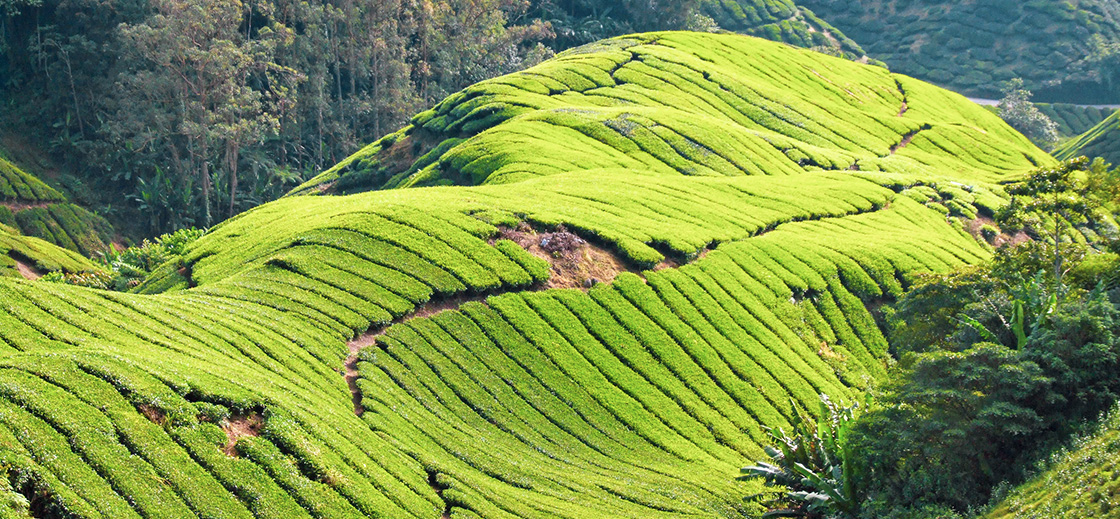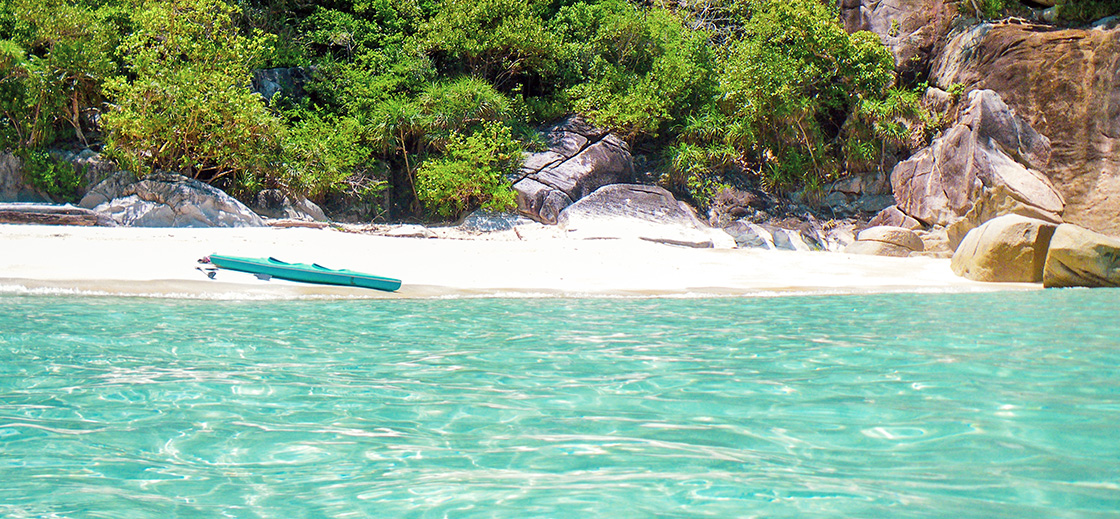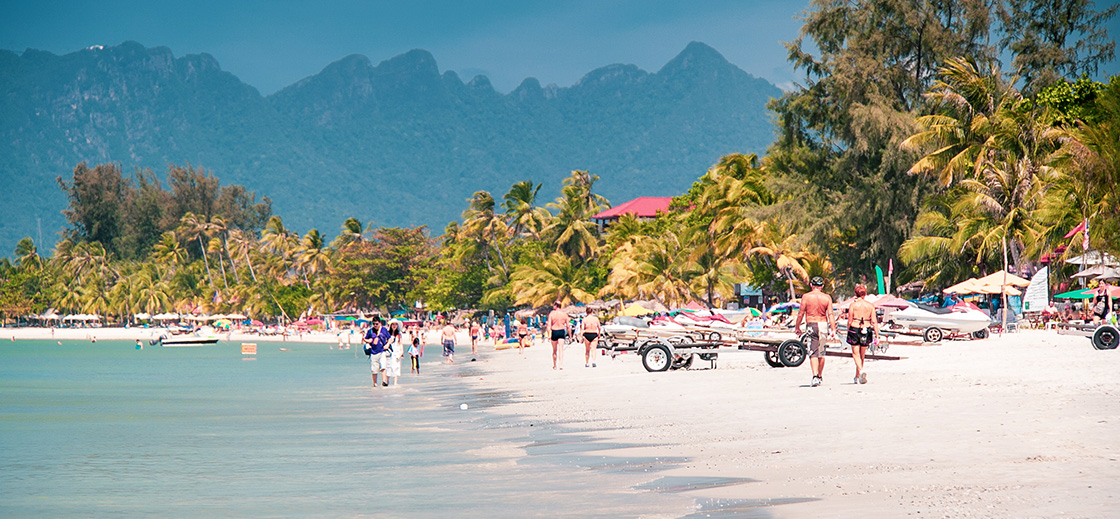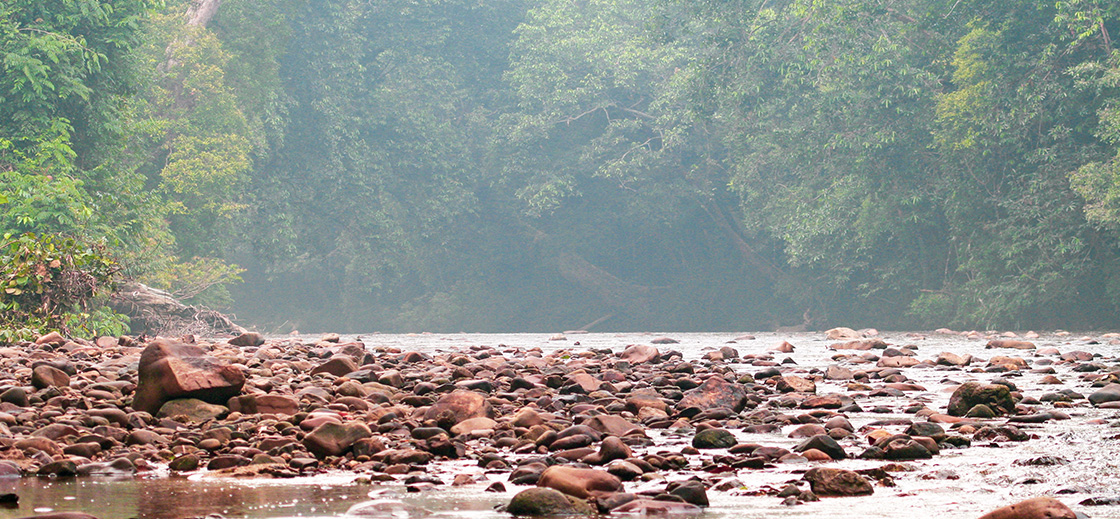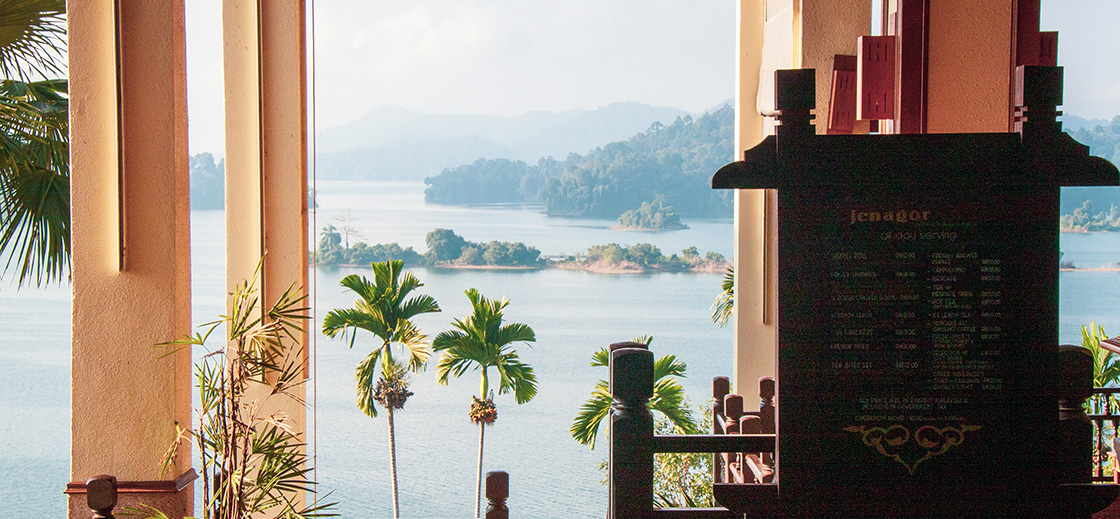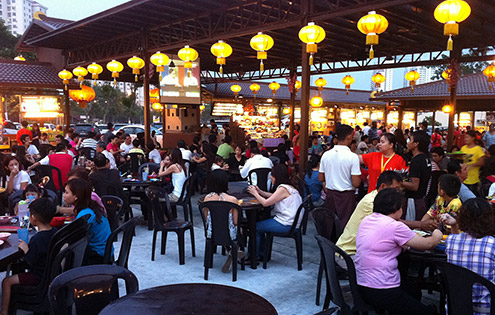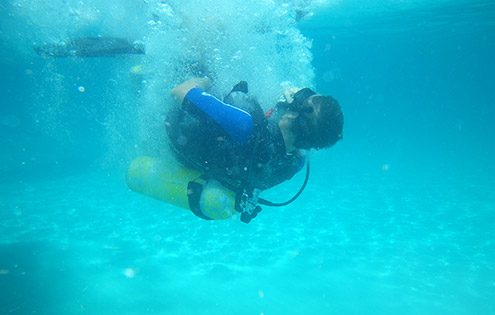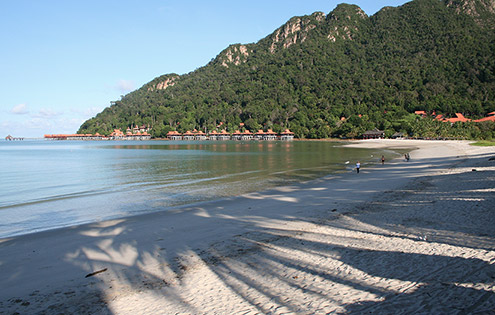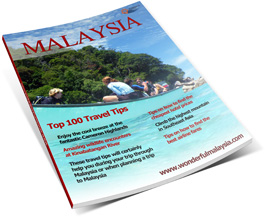Tourism and travel information Malaysia
On this page:
- Bargaining
- Emergency numbers
- Alcohol
- Embassies
- Currency in Malaysia
- People
- Neighboring countries
- Drugs are prohibited
- Diving and snorkeling
- Electricity
- Electronics
- Etiquette
- Tipping
- Payment options
- Hawker stalls
- Peak season
- Hotels
- Vaccinations
- International driver's license
- Internet
- Jungle
- Climate
- Kuala Lumpur International Airport
- Medical facilities
- Mosquitoes
- Counterfeit items
- Breakfast
- Passport
- Postal service
- Ramadan
- Luggage
- Shopping
- Smog
- Language
- Telecommunication
- Time zone
- Travelers Declaration Form
- Tsunami
- Holiday checklist
- Transport options
- Flying to Malaysia
- Humidity
- Food
- Water quality
- Sunburn
Bargaining
Bargaining is a habit in Asia. However, you need to know in advance when and where you can bargain. You can bargain considerably for all articles at the night markets (Pasar Malam), negotiating on the price is just part of life in Malaysia, especially in the Chinese district (Chinatown) in cities such as Kuala Lumpur and Georgetown. In the various modern stores it is not usual to bargain. If you try it anyway, then do not be surprised when they look at you surprized. However, nothing ventured, nothing gained. What you can do in the modern shopping malls is to ask for special offers, discounts and a lower price should you buy more items. Often you will get a lower price, even in the luxurious shops.
Emergency numbers
- Police 999
- Fire department: 994
- Hospital 999
- Tourist police 999
Alcohol
Even though Malaysia is an Islamitic country, you are able to buy alcohol almost anywhere, especially in areas where there are a lot of Chinese. This also applies in the big Malaysian cities. It is more difficult to find alcoholic beverages on the east side of the Malaysian peninsula in the more Islamic provinces Kelantan and Terengganu. In cities such as Kota Bharu and Kuala Terengganu you can only drink a beer in (some) hotels. On the islands at the (east) coast you will be able to buy alcoholic beverages at most of the resorts and restaurants. Besides (mainly imported) beer, you can also drink cocktails, liquor and wine at these tropical islands (a few examples are Perhentian, Redang and Tioman).
Embassies
Consult the list of all embassies in Malaysia here.
Currency in Malaysia
The currency in Malaysia is the Malaysian ringgit (RM), one ringgit is 100 sen. There are 5, 10, 20 and 50 sen coins. The notes have the following values 1, 5, 10, 50, 100, 200, 500 to 1000 ringgit. Usually you will pay with 1, 5, 10 and 50 ringgit notes. 100 ringgit notes are a problem, because most shops are not able to give change (especially with the hawkers along the street). Have a look at the actual exchange rate for the ringgit compared to other currencies at www.xe.com.
People
Malaysia has numerous groups of people each with their own religion. Malay (Malaysian population - 53%), Chinese, Indians, Indonesians, Arabs and Westerners inhabit Malaysia. Though there sometimes can be quite some friction between the different populations, they get along fine most of the times.
Neighboring countries
Malaysia borders directly on five countries: Indonesia in the south and the east, the Phillipines in the north above Borneo, Thailand in the northwest and Singapore in the south of the peninsula. There is also the small oil rich state of Brunei located between the states of Sabah and Sarawak on Borneo.
Drugs are prohibited
Do not take any drugs with you to Malaysia! Smuggling or trafficking drugs will lead to the death penalty and being in possession of drugs will be punished severaly. Make sure that you have a doctor's or pharmacist's declaration regarding specific medication. Always keep an eye on your luggage and handluggage when you are traveling to and within Malaysia.
Diving and snorkeling
Malaysia is a fantastic destination for diving enthusiasts, especially the many tropical islands on the east side of the peninsula offer amazing scuba dive sites. The best diving spots (world famous diving locations) are on the east side of Borneo, where you will find the islands Sipadan, Kapalai, Mataking, Lankayan and Mabul. Snorkling is also possible around these islands. It is also perfect diving and snorkling along the east side of the Malaysian peninsula near islands Perhentian, Redang and Tioman. The famous tourist island of Penang and Langkawi are less suitable for diving and snorkling fans, because there are hardly any diving spots along those islands (compared to the earlier mentioned areas). There is, however, a small island called Pulau Payar at about an hour's boat ride where you can snorkel and dive without a problem (though it is quite touristy).
Electricity
The voltage in Malaysia is at 220 volt. The wall plugs are only suitable for English plugs. It is therefore recommended to take a universal adaptor with you. Most hotel receptions will have them available to purchase or for hire and usually these special adaptors are also for sale in the supermarkets.
Electronics
In many Asian countries, including Malaysia, you are able to purchase electronics in many shops. There are several malls where you will only see shops with cameras and computers (e.g. IMBI and Plaza Low Yat in Kuala Lumpur). These items are not always cheaper. As a result of the coming of many webshops, these items may only be a little bit cheaper in Malaysia. However, accessories such as camera lenses, bags, headphones etc. are usually cheaper. Keep an eye on the law regarding importing luxury items, because you risk a serious fine if you take too many valuable items with you without declaring them at customs.
Etiquette
- Take off your shoes when you enter tempels or when you enter the house of a local Malaysian.
- Always read what you are / are not allowed to do before entering the shopping malls.
- Always check what you are / are not allowed to do at the entrance of a temple or other attractions.
- Cover legs and arms when entering tempels.
- Topless sunbathing is prohibited by law.
- Tourists are allowed to eat during Ramadan, but you can ask yourself whether it is nice if all fasting Muslims can see you eat.
- Point with your thumb and not with your index finger.
- Always shake hands with your right hand.
- No kisses if you meet or say goodbye to Malaysians (not common).
Tipping
Giving a tip is not a common practice in Malaysia. The standard service fee (10% government tax & 5% service charge) has already been included in the total amount. It is not a problem to give a tip when you go to a Western eatery.
Payment options in Malaysia
Malaysia's currency is the ringgit (RM). You could exchange your own currency at the banks and exchange agencies, but making use of the ATMs is easy and – especially for big amounts – a lot cheaper. Credits cards such as American Express, VISA, Diners Club, Eurocard/Mastercard are generally accepted in most places in Malaysia. Traveler Cheques are a bit outdated; the costs associated with exchanging the money are not worth it.
Hawker stalls and food courts
Usually the locals buy food from the so-called hawker stalls, a group of stalls along the road or on a plaza. In general, the quality of the food is very good in Malaysia. To be on the safe side, just look at the size of the crowd at the different stalls. If there are many locals at a certain stall, then you could assume that the food is good (however this is not always the case). The same can be said about the eateries at the shopping malls. Those food courts have often taken over a complete level. The hawkers’ stalls at Penang are especially good, and the island is also known as the best place to find delicious food in Malaysia.
Peak (or high) season
Malaysia can be visited all year round. So, there is not a clear tourist peak season. However, during the year there is a rainy season or monsoon, depending on the place within Malaysia that you want to visit. Most European travelers will visit Malayisa between June and September which coincides with the summer holidays. The Western festive season (Christmas and New Year) is also a popular time for tourists to visit Malaysia, especially for travelers from Australia and New Zealand (which is peak season to them).
Hotels
There are many top quality hotels in Malaysia and even backpackers will find the right accommodation. There are sufficient low budget hostels, where you can stay for just a few ringgits per night. The average three or four star hotel will offer you everything you can imagine, including good rooms with airconditioning, WIFI and often situated in a nice place. The first class hotels will have everything that you will expect, luxury, fantastic meals and excellent facilities. You can easily book the hotels via the internet on sites such as Booking.com and Agoda.com, both offer good prices. It is actually better to make reservations beforehand as prices are usually much cheaper that way. Walk-in rates at 3 star hotels and above are usually less affordable compared to reservations at hotel websites or tour agencies (made beforehand).
Injections & vaccinations
There are no compulsory injections & vaccinations for Malaysia. Usually it is advised to at least get vaccinated against DTP and Hepatitis A. In addition, malaria treatment is prescribed when visiting the inland areas of Sabah and Sarawak on Borneo. Getting vaccinated against typhoid fever is often not a bad idea either. The most important thing is to let your GP, the municipal health services or the institute of tropical medicine inform you in advance. If you are the adventurous type, then a Hepatitis B vaccine is also advisable, these shots are considerably cheaper in Malaysia.
International driver's license
To rent a car, a motorcycle or bike you will need an international driver's license, but sometimes they will allow you to rent a car with a standard driver's license and a copy of your passport (or even with only your passport). However, it is advisable to – if possible – take your international driver's license with you to avoid any risks.
Internet
All big cities and towns have internet cafes in Malaysia and the same goes for the many tourist destinations within Malaysia. Using the internet cost only a few ringgits per hour. In the hotels there is often free wireless internet but some hotels will charge for internet use in the hotel room. There are many places in Malaysia with free wireless internet including hotels and the various shopping malls. Starbucks and the Coffee Bean also offer free wireless internet, but for that you will need your own laptop or mobile phone with wireless connection. Ensure to never leave any personal details on the pc at the internet café and make sure that the pc that you are using does not save any personal details.
Jungle
Malaysia has the oldest jungles in the world with, for example Taman Negara National Park, the oldest primary rainforest on earth. Most of this jungle can be found on Borneo in the Sabah and Sarawak provinces. Even if you are only staying at Peninsular Malaysia you can easily visit the magnificent jungle, because Taman Negara is only 2 hours away from Kuala Lumpur. Other beautiful nature reserves in Malaysia are: Endau-Rompin National Park, Lake Kenyir, Royal Belum State Park, Danum Valley, Bako National Park and Gunung Mulu National Park.
Climate
Malaysia has a tropical climate and as a result you may experience a daily rainshower. So, the answer to 'Does it rain from time to time' will be yes, but usually that will only last for about half an hour every day, usually in the afternoon and during raining season there will be rain and thurderstorms during the night. The west side of the peninsula has a mild rainy season, roughly between June and September when it is noticibly wetter than during the rest of the year. There is a possibility that it rains non-stop for days, but the chances are not that high. The east side has quite a heavy monsoon between October and February. During those months there is not that much to do as a tourist as resorts are closed and boat services are not operating. Borneo does not really have a raining season, but it is sometimes affected a little by the typhoon season. It also rains daily (heavily) at Borneo for brief moments. The weather forecast will almost always indicate 'cloudy with rainshowers'. However this is not an accurate image, because generally it rains heavily daily for a short while only.
Kuala Lumpur International Airport
Intercontinental flights to and from Malaysia all arrive at the Kuala Lumpur International Airport (KLIA). This enormous airport is about one hour's drive from Kuala Lumpur (+/- 50km) in the south of the city right next to Sepang Circuit. From the airport there are several ways to travel to the capital city. You can travel by taxi, premier taxi, KLIA Express or with the express bus. Next to KLIA is LCCT; a Low Cost Carrier Airport, the hub of the budget airlines such as AirAsia.
Medical facilities
Malaysia is a modern country with modern medical facilities. If you are staying in the bigger cities, medical assistance is always near. It becomes another story when you are visiting the jungle, but even there you will still be able to count on proper medical assistance. The hospitals are in general as modern as they are in your country of origin. If you do not feel well in the tropics, it is not a good idea to wait too long before taking appropriate action. As soon as you feel unwell, weak or lightheaded, you have to take immediate action. Go to the lobby of your hotel and inform them that you do not feel well. Dehydration is very common in the tropics, ensure that you have sufficient water with you (or that there are enough places where you can drink).
Within Kuala Lumpur city center there are quite a few 24 Hour Clinics; one is located nearby Lot10 shopping mall. To get there you follow the monorail from the main entrance of the mall into the direction of the PETRONAS Towers about 50/100 meters and you see the small clinic on your right hand side (along Jalan Sultan Ismail).
Mosquitoes
When you visit Malaysia it would be wise to take Deet with you. Deet protects against mosquitoes, more especially the Dengue mosquito. If you catch the Dengue virus, you can become very ill (in some cases with a deadly result). Unfortunately, there is no remedy and the Dengue mosquito is active during the entire day, especially in the humid areas (in bigger cities). When you go and eat at a hawker's stall, do not forgot to rub on some Deet. Deet is available in spray or gel with the spray being stronger.
Counterfeit items
There are quite a few fake articles being sold in Malaysia, especially at the popular night markets. For example along Petaling Street (Chinatown) you will see racks full of fake handbags and branded clothing. Do not take any unnecessary risks and do not buy any counterfeit items. Some countries are very strict and actively check travelers who are returning home from their holiday destination with those counterfeit items. Besides, quality is often inferior compared to its genuine counterpart.
Breakfast
Locals eat warm food such as rice or noodles at breakfast, but most tourists are not used to this and rather have a Western breakfast. Hotels will always have Western breakfast. The difference in quality is often noticeable between the different hotels. A typical Western breakfast in a hotel in Malaysia includes white bread, fried eggs, some beans and a saucage, a slice of cheese and some jam. In addition, you can ask for yoghurt and milk and sometimes even pancakes. If you do not (always) want to have breakfast at the hotel, you can also visit the shopping mall from 10am onwards. There are many coffee shops and other eateries where they have nice sandwiches. The Loaf Bakery offers very good breakfast and the same can be said about Délifrance, Dome, The Coffee Bean and Starbucks.
Passport
Your passport has to be valid for at least another 6 months after your departure from Malaysia. If you have a stopover in Malaysa, you can stay in the country for a maximum of 72 hours without a visa. On arrival at the Malaysian airport - Kuala Lumpur International Airport – you have to fill in an entry card (TDF – Form). This card and your passport are necessary to be able to enter Malaysia. Tourists from Europe and the US are allowed to stay in Malaysia for 90 days on their tourist stamp. More on VISA in Malaysia.
Postal service
Each Malaysian city has one or more post offices. Sending letters or a package via seamail is very cheap, but you need to be patient. A package may take up to 6 weeks to arrive in the States or Europe. Post office opening hours are usually between 8am and 8pm or coincide with the opening hours of the shopping mall (where you will often find the post office).
Ramadan
Malaysia is mainly an Islamic country which means that Malays participate in Ramadan, a special month in the Islamic calendar, and more specifically the nineth, when they fast between sunrise and sunset. Ramadan is therefore also known as the month of the fast. The exact start of the Ramadan depends on the appearance of the sickle-shaped new moon.
As a tourist, you will hardly notice anything with regards to the Ramadan. Almost 50% of the country is non-Muslim and they will usually eat throughout the day, but there is an obvious difference with the Islamic provinces on the eastside of the Malaysian peninsula. Here some chains are closed during Ramadan (for example McDonalds) and you will not see anybody eat anything during the day. Ramadan is not visible at the west coast (for example the islands of Langkawi or Penang). The end of Ramadan is celebrated with a festive event, the sugar festival (Eid ul-Fitr).
Luggage
You can take 20kg of luggage when flying economy class to Malaysia. Your hand luggage is allowed to weigh a maximum of 5kg. Please note that the hand luggage has to comply with certain measurements which differ from airline to airline. When using the airline AirAsia for domestic flights within Malaysia, you have to pay extra for luggage check-in (you are allowed to carry 7,5kg of handluggage on board free of charge). The question of whether to take a bag (backpack) or suitcase to Malaysia is simple: both are perfectly possible. Even when you go to the jungle of Borneo, you can easily travel with your suitcase.
Shopping
Shopping is a favorite activity for the locals. Even though most of them only do window shopping, they keep coming back to the various big and luxurious shopping malls – especially during the weekend with traffic jams around the malls during opening and closing time. There are shopping centres with often more than 400 shops. In general, tourists have most buying power in Malayisa.
Smog
From time to time Malaysia has to deal with smog, usually between June and September. It mainly happens in the big cities and other busy areas. The smog is often caused by forest fires in Sumatra and Borneo (Kalimantan), but also by the enormous pollution due to emission of cars (in KL). When the wind blows inland in the direction of Malaysia, the country will be seriously affected.
Language
The offical language in Malaysia is Bahasa Malayu, but almost everyone speaks English (some even fluent). English has become the main language, especially amongst young people. Everyone speaks sufficient English, even in the tourist areas. However, Malaysians appreciate it if you have learned a few words in Malay.
Telecommunication
The dial-in code for Malaysia is +60. You can use your own mobile to call within Malaysia, but note that this is very expensive. It is much better to purchase a sim card from a cheap provider at arrival. With that sim card, you can call cheaply within Malaysia. Hotlink, Celcom and Digi are the most popular providers of prepaid sim cards.
Time zone
Malaysia is located in time zone: GMT +8. Daylight Saving Time (DST) is not observed in Malaysia.
Travelers Declaration Form
You receive the Travelers Declaration Form (TDF) in the airplane in which you have to fill in a few compulsary details. You are also given this form when you enter the country at the border or with a boat. The TDF form has two sections of which one is specifically for tourists and business travelers. You have to declare the imported amount of money on this form and whether the amount is higher than RM1000 when imported or exported. According to Malaysian law, you are not allowed to import or export ringgits.
Tsunami
The whole of Southeast Asia was at the end of 2004 victim to one of the biggest natural disasters in history. Hundred thousands of people were killed as a result of the enormous tsunami, especially in Indonesia and India. Malaysia mourned the death of more than 60 people, especially on the island of Penang. Both islands, Langkawi and Penang, where just outside the reach of the tsunami because they are 'protected' by the northern tip of Sumatra. Since the tsunami, both countries have made enormous investments to get warning systems up and running. Malaysia is a developed country and the medical facilities are in general good to very well-organized.
In August 2007, there was yet again fear caused by a small tsunami and the country was immediately in a state of readiness. Beaches on Langkawi and Penang were very quickly evacuated. Luckily everything was fine and eventually there was no tsunami. So, tourist you travel to Malaysia should not unnecessarily fear a disaster such as the one in 2004. This does not mean that nothing can happen. However, Malaysia is not in the epicentre of danger and the same can be said about Singapore.
Holiday checklist
The following items are advisable to take with on your holiday to Malaysia:
- Passport
- International driver's license
- Hep.A and DTP vaccinations
- Deet
- Norit
- O.S.R. (when you are staying in the jungle for a longer time)
- Imodium
- Paracetamol
- Sunscreen
- Plasters
- Copy/copies passport
- Itinerary / Vouchers
- Flight itinerary (AirAsia, Malaysia Airlines or other airlines)
- Malaria treatment (when you are staying in the jungle for a longer time)
- Medical insurance card
- Contact details family
- Travelling plan (leave behind with the family)
- Torch or headlight
- Cap
- Aqua bag
Transport options
Malaysia has a modern network of roads. However, around the big cities it becomes very hectic with daily traffic jams. Renting a car in Malaysia is lots of fun, but plan a nice trip in advance to prevent any suprises. Driving in KL's city centre is for example, not that much fun, even though the traffic situation has improved in recent years – due to many streets being made into one way. You can pick up and drop off your rental car at different locations which is very practical when you want to visit a major part of the country. Car rental on Borneo is not common. One of the famous local car rental companies is Hawk Malaysia.
Furthermore, Malaysia has a good train network with routes running through the whole country, even to Singapore or Bangkok. Low cost carrier AirAsia, Firefly, Malaysia Airlines and MASWings give you the chance to fly for a few ringgits per single trip. Every city has a bus network and for short distances it is convenient to take a taxi or the LRT (Light Rail Transit) in Kuala Lumpur.
Flying to Malaysia
There are several airlines flying to Malaysia. Malaysia Airlines and Singapore Airlines have the most frequent flight schedule on this route. A flight from Europe will take about 12 hours. If you decide to fly Singapore Airlines, then you will make a short stopover in Singapore before continuing the trip to Kuala Lumpur. Other very good airlines are Qatar, Emirates, Etihad, Cathay Pacific and Lufthansa. More.
Humidity and camera's
Malaysia has a tropical climate, the humidity is very high. Your camera will often be affected by this. A good tip is to make sure that your camera gets used to the climate and humidity very slowly. So, do not take the camera out of the bag and immediately turn it on, but take it out of the bag and leave it to acclimatise. It may be a good idea to take some silicone bags with – available at most photo shops, which will absorb the humidity in your bag (even though, your camera lens will keep condensating your entire holiday).
Food
Malaysians love food! Local people eat rice dishes in general and that applies to all population groups in the country. This does not mean that you are forced to eat rice for the duration of your holiday. There are many different eateries including many western restaurants. Most shopping malls will have a chain, whether it is a restaurant chain (like T.G.I. Fridays, Chillis, Tony Romas and Pizza Hut), coffee chain (Starbucks, Coffee Bean, Dome) or fast food (McDonalds, Burger King, Wendy’s, Pizza Hut, KFC).
Food is usual mildly spicy if you indicate in advance that you want the dish 'not that spicy', but that also depends on the place where you eat the dish. For example, if you eat in the hotel it is okay, but if you eat along the street, some of the dishes can be very spicy. Malaysia is generally not known to be a country where the food is overly spicy. You will not pay more than a few ringgits for a complete meal.
Water quality
It is not a problem to drink water from the tap in Malaysia, but unfortunately you can always taste the chlorine. Besides, you do not want to take the risk of becoming ill during your trip due to the tap water (even though we have not heard of any cases). Rather buy bottles in the supermarket.
Sunburn
In Malaysia the sun is everywhere almost all of the time. Even when it is cloudy or when you are in the shade, you can easily burn within the hour. In the big cities you can also get sunburned in that way. Ensure that you carry enough sunscreen. You can already buy the sunscreen in your own country, but also in Malaysia. Make sure that you have enough water when you are on the road and a cap is useful to prevent heatstroke. Do not sunbathe on day 1 of your holiday, because you can get easily burnt in no time.
